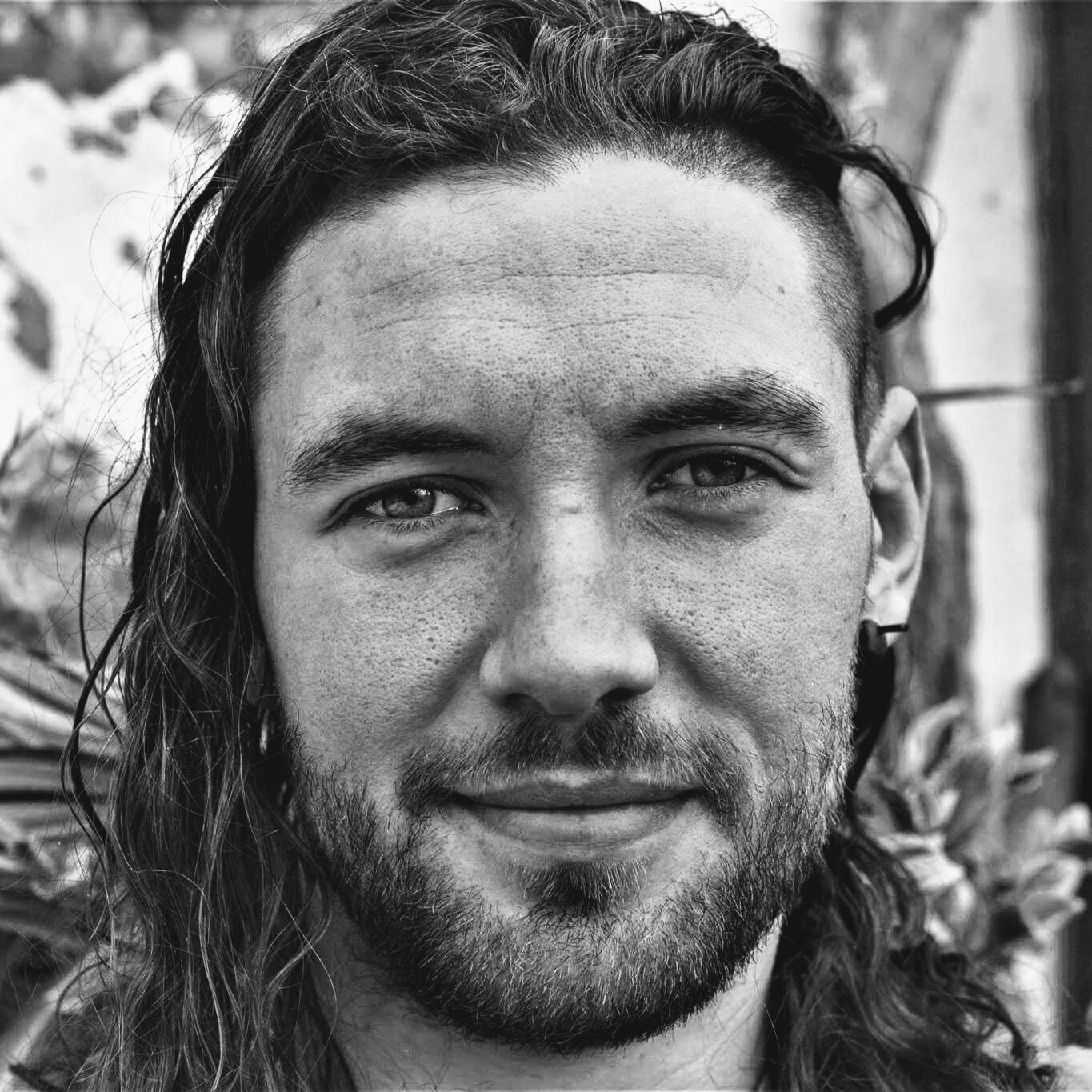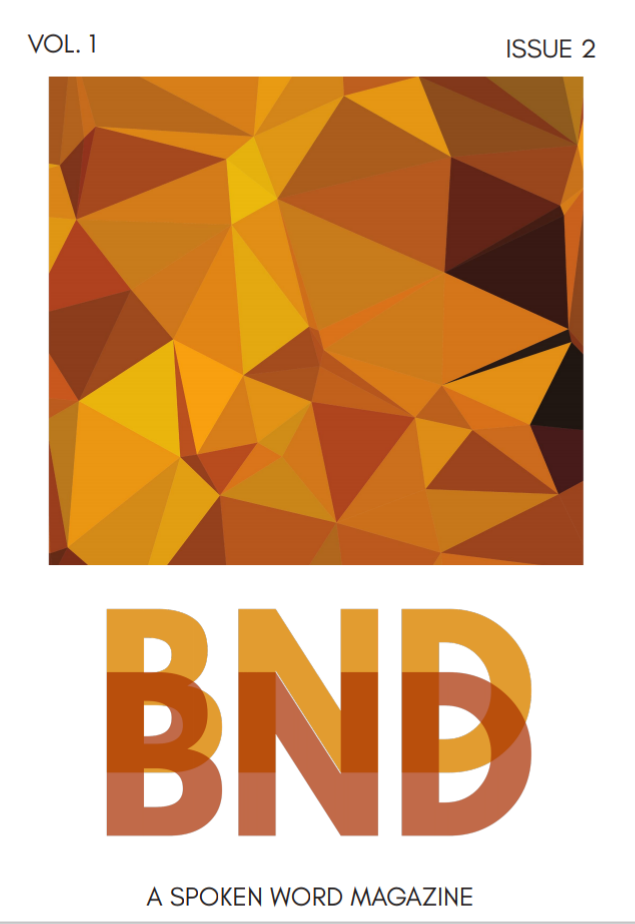The Poet Who Came in From the Cold
Poet Raven interviewed by Eithne Dodd about the history of Spoken Word in Ireland and his hopes for the future.
When Raven moved to Dublin from San Francisco in 2005 he hated it. The Celtic Tiger was in full swing and, it seemed to him, everybody was fake. One thing he did come to like though was the spoken word community.
Photo of Raven by Richie Tyndall
There were just two regular spoken word events that Raven was aware of when he began performing in Dublin: Write and Recite and Poets Anonymous.
“Write and Recite was a bunch of rabid lads,” Raven said. The nights there could get so rowdy that the event was regularly kicked out of pubs and had to find a new location.
“An old codger named Gerry ran it . . . every time we got turfed out of one place, he found another for it to happen.”
After a few years, Raven began running a regular spoken word night under the same name. The original Write and Recite had stopped running. Raven along with Cliff Horseman took on the running of the event. For a while it was called Raw before they settled on the name Tongue Box. The event ran from about 2009 to 2014.
“In that time, because so many spoken word nights came and went, Tongue Box actually became one of the longest running spoken word nights in Dublin. And it was actually pretty popular.”
After he had become a regular at events in Dublin, he began travelling around Ireland as a poet with the Irish festival scene. He performed at Electric Picnic and Body and Soul. “It was a nutty ride in those early days,” Raven said.
“At first, I was really just doing it for the craic and the free ticket. Then I started taking it seriously,” Raven said. He stopped getting high before shows and began to ask for pay.
“It really just comes from getting to a point where over the years you truly value the work that you do. You know, I put a lot of work into not only the writing, but the crafting of performances. And it's worth something”, he said.
Raven did enter some poetry slams but rarely. “I never do well in them. The aspect of competition always throws me off.”
“Poets are storytellers. That's what we are. You know, I when I step on stage, there's something I desperately need to say and the aspect of squeezing into three minutes and doing it on the point system? Nah. It just knocks me off the fucking game.” Comparing the spoken word scene then and now, one of the major differences he sees is the age profile of performers and spectators at spoken word events. Many of the people who were regulars when Raven began in the mid-2000s, no longer perform.
“It didn't really push them out. But I feel like maybe they lost a place in it when it got younger. I don't know that they'd ever feel that. It was never anything that was intentional. But I definitely saw the scene shift”, he said.
“There were some really fine poets on the scene, it's a shame to have seen some of them disappear simply because if they had been interested in building their word craft, they would have been absolutely incredible at this point.”
Does spoken word have a retention problem? “No, I don’t find that”, Raven said. “There is a younger generation who are turning into an older generation as even newer people come along. The people who are there absolutely love it”. The older spoken word performers have often developed their word-craft in new ways. Raven believed that was a positive even if it means they leave spoken word. He cited Sarah Griffin as a poet who is now a successful novelist. Some people are in the scene for the long haul, Raven said, whereas others “take the form and see what other things they can do with it”.
Raven himself left the spoken word scene for a few years. “I had to get some things in my head straight. I'm still getting some things in my head straight,” Raven said. “I kind of disappeared, became a hermit for a couple of years and wasn't actually writing very much either”, he said. When he re-emerged, the scene had completely changed. “Suddenly there was this whole group of youngsters that I’d never seen”, he said. These youngsters had heard of Raven but hadn’t ever heard him perform. “It had gotten to the point where my name was spoken of in whispers”, he said. “I thought I have to get out more and see this whole amazing group of youngsters.”
Portrait of Raven by Dublin artist Caoimhe LaVelle.
Raven was incredibly positive about the current state of the spoken word scene. Speaking to BND in June 2019, less than two months before he died, he said the scene had mushroomed.
“The sign of a thriving scene is that it's a scene that's now got audience beyond the performers,” Raven said. “Write and Recite was a great night to go to but you know, your performance got a little bit lazy. Every week you were performing for the same old fucking faces - It was everybody who was taking the stage later on.”
Now, Raven said, that’s all changed. He recalled a packed event run by Lingo in the Smock Alley Theatre a few years ago. “It was about midday and someone said to me ‘can you believe this?’” referring to the packed room. “A spoken word event. The middle of the day”, Raven said for emphasis. “I was like ‘fuck yeah man’”.
One of the most notable changes the Irish spoken word community has seen is the attitude shift in Poetry Ireland towards it. Raven isn’t sure when that shift began to happen but he reckoned it was poets banging on their doors for several years begging Poetry Ireland to take notice of where poetry in Ireland actually was. Fellow spoken word poets told Raven that Poetry Ireland was only interested in “page poetry” (as opposed to ‘stage poetry’). “I think that was true to a certain extent. They were very academic,” Raven said. “At some point they [Poetry Ireland] absolutely realised the value of not only recognising but utilising performing poets,” Raven said. Particularly in schools, many performance poets now work with Poetry Ireland in some capacity.
Poetry Ireland, Raven believed, had begun to recognise that poetry could die in the way that it was being taught to students. Although there is a difference between acknowledging and understanding an art form. “They’ve acknowledged it but I don’t think they get it”, he said. “They’re an official, academic institution that’s trying to stay relevant”, Raven said. “Sometimes they miss the mark but they’ve actually done some lovely programmes and taught courses”. He shrugged: “shit changes slowly”. In the meantime, Raven said, Poetry Ireland isn’t needed. “This is such a thriving scene without the official body and it’s grown without their attention or sanction”.
“I don't think [the poetry scene] is in any danger of dying. It’s thriving in plenty of live events. You're always getting new converts. I love it when somebody comes to a poetry event and they've never been, or someone finds out, I'm a poet, and they ask me to do one for them. And there's a moment of surprise where it's just not at all what they were expecting.”
Throughout our conversation, Raven would suddenly remember the name of yet another poet that he found inspiring when he was establishing himself in Dublin: Paul Casey; Maighread Medbh; Karl Parkinson; Abby Oliviera; Ann Tannan; Kit Fryatt and Ophelia McCabe were just some of the people Raven would shout out as we spoke. These people often helped to establish spoken word in Ireland to the place it is today. Raven often accompanied their names with phrases like “how could I forget” or “she was an absolute powerhouse”. It was clear that remembering them excited him. Towards the end of our interview, I remarked that it seemed like Raven had a good life.
“It's actually a hard life,” Raven corrected. “It really, really is. I'll tell you at 53, I've actually found a lot of my appetites finally dying. “In my 20s in my 30s I had an appetite, like a huge appetite for everything. Food, drugs, sex, crack, all of it. And at this point, all of that is coming down. And I can see things so much clearer. My purpose and my direction is so much clearer. But the words are still a distraction, constantly, constantly, constantly. “I used to get people who felt like that had a problem with their weight say to me ‘I wish I was you. It would be great to just like to eat all the time.’ No. I was hungry all the time.
“And the words are kind of the same way. There's a constant battle there. They come at me and I started to recombine them and do things with them. By switching the letters around, it's a lot easier.” Raven took a lot of solace from poetry and his performances. “I’ve been around the scene for a long time,” he said. “I did a piece at an Open Mic the other night and got some lovely kudos from some folks that I’d never heard before”.
“That’s the lovely thing about this scene. Just when you think you know everybody, I sit my ass down and some people who have just been saying some lovely stuff about my stuff, they step up and fucking blow me away. I’m just like ‘wow’”.
Originally published in BND Magazine Vol. 1 Issue 2
Article Image by Photographer Turloch O’Brien
Listen to ‘Raven: On Home’ from Season Two of the Boundless & Bare Podcast










